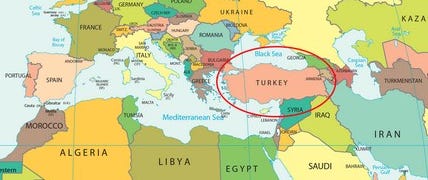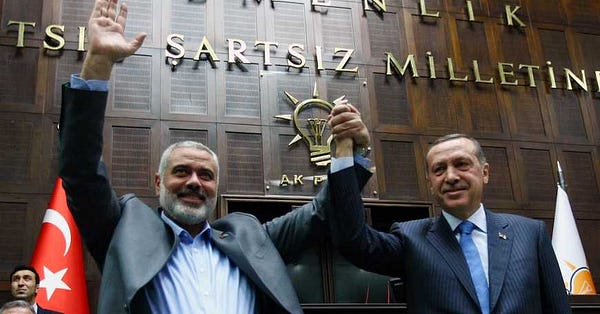INSIGHT: Trump's Economy Fiction, Putin's Navalny Lies, Erdogan's New Affronts, Australia's Pandemic Push
The facts behind Trump's Propaganda; the Track Record Behind Putin's Smears; a Realignment in the Eastern Mediterranean, and an eye-popping anti-pandemic push in Oz.
INSIGHT: POWERFUL LIES SMASHED BY FACTS

In an era of gaslighting, of authoritarian drift, of norm-breaking by power figures, the United States has proven that, however exceptional, it’s not immune to these disturbing trends afflicting countries around the globe. Fortunately, the U.S. has other forces at play, and efforts to conceal the truth run into difficulties; something less likely in places with shallower democratic roots. We’ve been seeing it this week, here and elsewhere.
The Highlights:
Trump’s Most Powerful Lie, that he built the most successful U.S. economy in history, collapses under scrutiny.
Putin’s propaganda machine tries to weave a web of lies about what happened to his most prominent critic, Aleksei Navalny. What the facts tell us – and the world -- about what happened, and about Putin.
In the Middle East, and the Eastern Mediterranean, a new political realignment is taking shape. Turkey’s Erdogan threatens Greece, sparking alarm not only in Athens, but also in Paris, Abu Dhabi, and Berlin, and helping make friends out of old foes.
In Australia, when it comes to the coronavirus, they mean business. The eye-popping pandemic-control ideas down under.
TRUMP’S MOST SUCCESSFUL LIE

Don’t feel bad if you believe President Donald Trump’s claim that he produced spectacular economic results until the pandemic struck. You are not alone. Polls show most Americans – even now, in the midst of the fastest economic contraction since the Great Depression -- still approve of Trump on the economy.
That is the most potent of Trump’s more than 20,000 documented lies, because it is taken as truth by many, and it touches on a subject that everyone cares about, one that often determines the outcome of elections.
If nothing else, Trump is a marketing genius, etching his messages in the public mind. He has made the questionable boast nearly 400 times, going as far as claiming, falsely, that until the coronavirus, he had created, “the most successful economy in the history of our country,” and pretending he inherited a poorly-performing economy from the Obama administration. None of that is true.
Alongside this idea, Trump and his backers claim that if he loses reelection the Democrats will wreck all he built, bringing the economy and stock prices crashing. His economic adviser, Larry Kudlow, told the Republican National Convention, that under Biden America would “turn back” to recession.
Time for facts: The economy was doing just fine when Trump took office, unemployment was a very respectable 4.8 percent. It continued to drop under Trump. But there were more jobs created under Obama in the three years before Trump came to office than in the three years after his 2016 election.
Not just employment; economic growth during the first three years before the pandemic was, in fact, weaker than in the three preceding years under Obama.
Before the coronavirus, the economy did well, but it was fueled by a gigantic tax cut: much like improving your lifestyle by running the world’s biggest credit card balance. But growth was slowing sharply even before the virus hit.
GDP grew less under Trump’s “best in the world” economy than before. And, by the way, claims that the tax cut would pay for itself were another lie. The budget deficit exploded, predictably, as it tends to do in Republican administrations.
And since the pandemic? I believe the economy is in much worse shape now because Trump harmfully acted as if he had to choose between the economy and public health. As I wrote, without containing the virus, strong growth cannot return.
If you’re worried about your 401K or stock holdings under a possible Biden administration, I suggest we look at figures.
I’m not sure why Democrats don’t forcefully defend their very strong record on the stock market; maybe they’re afraid to seem too concerned about the wealthy. Presidents don’t control what happens to stock prices, but markets do much better when the president is a Democrat.
“From 1926 to 2019, we have had a Republican president for 46 years, and a Democratic president for 48 years. The difference in returns between the parties is pretty stark. The average annual return for the S&P 500 index when we had a Republican President was 9.12%. When we had a Democratic President, the S&P 500 average 14.94% per year. That’s a premium of a little more than 5.8% per year on average.”
The misleading information on the economy was one of the centerpieces of the Republican National Convention. I wrote about the first night, which to me looked like a Saturday Night Live parody, and the stream of deception that followed as the RNC unfolded its alternative reality bubble, sharply at odds with America’s dystopian times.
WHAT NAVALNY’S PLIGHT SAYS ABOUT PUTIN

Speaking of deceptions, let’s talk about Russia and opposition leader Aleksei Navalny, who is still fighting for his life.
Russian authorities at last granted Navalny permission to fly to Germany last weekend for treatment. Navalny, you’ll recall, suddenly fell ill on a flight over Siberia. The plane landed and he was hospitalized. The new lies, innuendo and obstruction started almost immediately.
Navalny’s family and friends believed he was poisoned, but doctors in the Siberian hospital would not say it – there were masked men intimidating the doctors – and Russian media ridiculously claimed he might be suffering from the use of “hallucinogenic” drugs.
In Berlin, doctors quickly confirmed that Navalny, still in a coma, was poisoned. He is stable but the prognosis is grim.
After the German doctors confirmed the poisoning, Russia tried a new mind-boggling lie, suggesting Navalny was poisoned during the flight to Berlin. Lying comes easily to authoritarians accustomed to manipulating public opinion.
Navalny had other enemies. so we may never know who poisoned him. But there is much we do know.
This latest in a long string of poisonings and sudden calamities suffered by Putin critics automatically brought to mind a single suspect, as I wrote in World Politics Review.
“That suspicions quickly centered on a possible assassination attempt by the Kremlin is another damning indictment for a president who has sought to earn international respect. A government whose critics routinely die mysterious deaths, or survive attempts on their lives, reveals itself to be outside the bounds of legitimate democratic behavior. That people suspect Putin orders the assassination of his domestic foes shows the grotesque image he has forged.”
TURKISH ACTION TRIGGERS A REALIGNMENT IN THE MIDDLE EAST AND THE EASTERN MEDITERRANEAN

I’m keeping a close eye on developments in the eastern Mediterranean, the far corner of that sea, where Europe blends into the Middle East.
There, Turkey’s President Recep Tayyip Erdogan has triggered a dangerous confrontation, sending the Turkish navy into Greece’s territorial waters, and raising the alarm of governments across Europe and the Middle East. With Greek and Turkish navy flotillas lined up against each other, the risks are immense. Already two ships collided earlier this month.
German Foreign Minister Heiko Maas called it “playing with fire,” warning, “any spark, however small, could lead to disaster.”
Germany is trying to defuse the situation, but led by France, many in the European Union, to which Greece belongs, blame Erdogan for the crisis, as do regional Arab powers.
The United Arab Emirates sent F-16 fighter jets to a military base in Greece in a warning to Ankara.
Turkey is trying to challenge the maritime boundaries in a region with enormous, newly-discovered natural gas deposits, but this is not just about natural resources. Turkey is expanding its reach across the region, intervening in Libya, Syria and elsewhere. And tightening its link to Islamist political groups. Erdogan, who has re-injected political Islam into the previously-secular republic, wants to build up his and Ankara’s role as leader of the Islamist political world. Expanding ties with Hamas are but one example.
As I mentioned in an earlier edition of INSIGHT, Turkey’s relentlessly aggressive foreign policy is one of the reasons for the developing links between Israel and the UAE. Turkey is becoming one of the fault lines in the region. The realignments are just getting started.
AUSTRALIA vs COVID-19


How seriously is your government taking the battle against the pandemic?
In the Australian state of Victoria, capital Melbourne, police are making sure residents observe the strict measures that helped Australia keep the number of coronavirus deaths low. Just 572 have died in a country of 25 million. That’s 22 deaths per million people, compared to 555 deaths per million in the United States. That means the US has 25 times more deaths per capita than Australia.
In the U.S., authorities mostly refuse to impose mask mandates. In Victoria, police are launching a plan to use drones to make sure people are wearing masks. The flying machines will also spot cars driving beyond the permitted five-kilometer radius, the maximum distance people are allowed to travel from their homes for the time being.
Those strict measures came as a recent snap-back. Restrictions had been lifted when it looked like the crisis had passed, but the virus resurfaced, so Melbourne declared a state of emergency to bring it back under control.
They are taking no chances.
That’s a wrap for now.
Stay healthy, stay informed, stay engaged.
Frida




